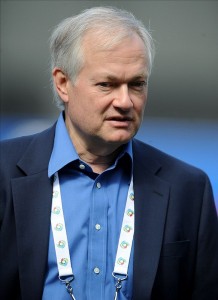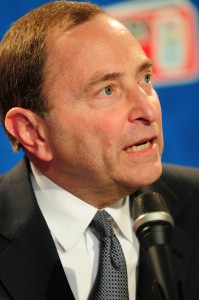
Something very strange and annoying is happening in this country, especially when business issues are discussed. People have somehow embraced the ridiculous notion that the men and women who own multiple corporations worth billions of dollars, not only are being victimized by one group or another, but are also immune to any kind of criticism. This is particularly puzzling when noticing that many suit defenders have never even worn one themselves. “Don’t you dare criticize us, you just hate us because we’re rich”, seems to be the idea animating these people. No, we don’t hate you because you’re rich. We hate you because you are greedy while pretending that you are not.
This applies to any chat about the NHL lockout.
Personally, I find demagoguery and drill instructor type noise about “bootstrapping” and “hard work” unbelievably tiresome. Work as hard as you like, but an absence of luck will keep you working…and nothing else. People are reluctant to admit that luck, not industry, is a difference maker at all, let alone the critical one. Becoming a billionaire requires more luck than James Bond could ever imagine experiencing.
But, I’m in the minority on that point, so we can shelf it.
For the record, the NHL has experienced miraculous growth since it was literally dead in a dumpster in 2005. The unknown “Outdoor Living Network” attracted a small but dedicated following, which reached a critical mass when NBC purchased the network, putting an end to that station’s testosterone titled “Versus” reign.
Forbes magazine, not anyone’s idea of a cheap socialist pamphlet, had this to say when they anticipated the “cantankerous” negotiations, or lack of which, we are witnessing now:
The average NHL team is worth 47% more than it was before the lockout thatcancelled the 2004-05 season. Let’s hope the NHL can get a more economically sound CBA without having another work stoppage. The average NHL team is worth 47% more than it was before the lockout thatcancelled the 2004-05 season. Let’s hope a the NHL can get a more economically sound CBA without having another work stoppage. Business has improved too much the past seven years.
Let me enunciate this again, because it’s important: Business has improved too much the past seven years.

On the surface, the same old gibberish amounting to “athletes are overpaid” and “owners take all the risk” might seem to hold more water than usual. But only on the surface, which many people are satisfied with.
It is true that profit margins are resembling fissures more than canyons, and this is because of player costs. The Parise-Suter signings will remind people of this. But honestly, whose fault is it SOME players are overpaid? Overpayment, by the way, is a subjective idea, held hostage by the whims of whomever is commenting, including myself.
Craig Leipold, the owner of the Minnesota Wild who is so trigger happy with his check book that a life in the U.S. Government might be more appropriate, embodies the hypocrisy on the owner’s side of the table perfectly. This man, who shelled out Crosby-like cash to players who are not Crosby, has been one of the most consistent voices shouting “offsides” during negotiations.
Craig, if player costs are the problem, then cut player costs. I’m sure you have multiple letters after your name, but even a blogger who occasionally comes up with a clever remark can understand this basic business principle. You can’t win without spending this kind of money? Sure, you can. Hire better scouts. Draft better players.
And do owners really take all the risk? Do they risk grave personal injury? Are they one shift away from financial ruin?

Players do not have a job without owners, and owners have no product without players. So this blackmailing attitude that the players should show undying gratitude is absurd. No one pays to watch Mark Cuban get pizza on his face, except maybe for the owner of a pizzeria.
At the risk of sounding naive (perhaps it’s too late), let me raise another question: Who would you expect more honesty from? The kid next door who you grew up playing street hockey with, or the 60 year old who makes the sticks you used? Is it the ordinary person who can play hockey extraordinarily the one hatching devious schemes? Are the players reading Machiavelli or Maxim on plane rides? Do they have some incredible understanding of how to use the supply and demand economic system to their advantage?
Probably not, and that is why I am more inclined to believe someone like Jonathan Toews, when he drones away in his unassuming voice, than the cold and calculating commissioner. And this is coming from a Detroit fan who despises the Blackhawks. Looking back over the last paragraph, I don’t think I’m being naive at all.
The players are not blameless of course. They should have taken the 50-50 deal that the owners offered. Donald Fehr, by all accounts, is a cutthroat, and perhaps has brought some unhelpful baggage to these proceedings. And it is laughable when players skewer Bettman in one breath, and praise their owners in the next. “The owners are being disingenuous…except for my owner,” is what they seem to be saying.
But make no mistake. The owners got us into this mess, and are making it worse by repeatedly walking out of negotiations.
There is a Neo-Red Scare going on in America right now. The remarks I’ve made above about business owners will make me a “socialist” or maybe even…gasp, a “progressive”, in the eyes of others.
I am neither of those things. I’m a hockey fan who loves to write, I’m tired of listening to lawyers instead of announcers, and I want my sport back.
It’s as simple as that.
thanks for the article.
It’s a devastatingly powerful when owners that are involved also own huge media corporations. A bit of an advantage? They do well not to make it blatantly obvious by showing a bit of everything. But the simple fact that any single fan could actually side with the owners or be confused about which side to support should be proof of a bit of brainwashing. The owners are ruthless businessman while the players are mostly average joe’s who made it big playing hockey. The players make millions, the owners are worth billions. One risks a bit of wealth while the other risks much of their health.
If you own an NHL team, it’s safe to say you have a few other investments and perhaps your NHL team even counts for a tiny percentage of your worth. It’s also safe to say you didn’t amass a giant wealth without stepping on a few toes. If you are an NHL player, you dedicate your life to just have a chance to succeed. What the owners did was a lazy slap in the face to the little guy. Pay up and learn how to run a business as a normal human being!
I know exactly. Players have to get what they can while they can. An owner can lose 200 million and still have more money than basically everyone in the world could even imagine. Cry me a river owners. Thanks for reading my man.
I always love it when people act like the players are entitled because they aren’t just willingly giving up their salaries in return for… nothing? And of course the owners who expect to make a profit no matter how badly they mismanage their money somehow aren’t.. It’s mind boggling to say the least.
It’s even more infuriating that the owners who are likely making good money (Jacobs and Snider) are the main ones behind this lockout and yet they use other teams losing money as an excuse. Even though they couldn’t care less about those teams because if they did they’d be willing to actually implement revenue sharing. The only thing they care about is breaking the union and trying to gouge more money out the players to make their wallets a little fatter. This becomes incredibly obvious when you notice that the same group of union busting lawyers has overseen the NFL, NBA, and NFL referee lockouts, as well as this one. The NFL was making money hand over fist and the NBA certainly wasn’t doing terrible, so why exactly should we believe that the NHL needs to lockout and demand more money from the players as well? It’s simply asinine and it revolves entirely around greed.
Only part of your article I disagree on is that the players should have accepted that “50/50” deal (it’s not even 50/50 with the escrow and deductions from HRR). That entire deal was PR bulls*** and really it was another deal in which the players conceded everything and the owners conceded nothing. If you take that 7% away from the players and put it entirely toward revenue sharing then maybe you have something but there was nothing in that offer that ensured the league wouldn’t do the same crap 8 years from now and once again say, “oh noez, teams are losing money again, we need more money NHLPA!”.